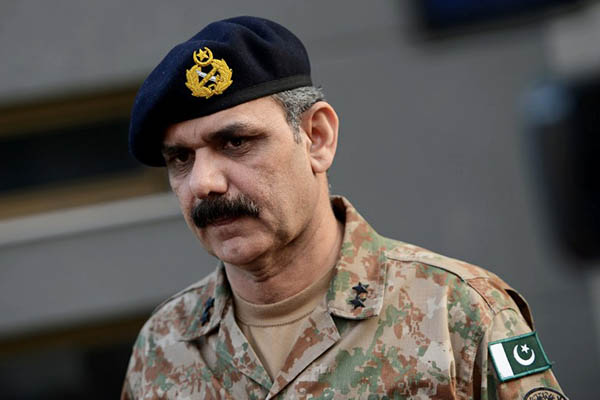
Farooq Naeem—AFP
In press conference, Army spokesman says core of militant group has been apprehended.
Pakistan’s military on Thursday admitted for the first time that the Islamic State group had a presence in the country, adding it had apprehended hundreds of militants and prevented them from carrying out major attacks.
The Army’s spokesman Lt. Gen. Asim Bajwa said forces had foiled planned attacks by I.S. on foreign embassies and Islamabad airport but denied the group was behind last month’s suicide blast on a hospital that killed 73, as it had claimed.
The comments confirming the presence of hundreds of militants stands at odds with previous outright denials. Last year, speaking from London, Pakistan Army chief General Raheel Sharif said the military would not allow “even a shadow” of the group to enter the country, though senior police officials in both Karachi and the Punjab province have said their forces have carried out raids against I.S. militants.
Pakistan has been battling an Islamist insurgency since shortly after it decided to ally with the U.S. following its invasion of Afghanistan in 2001. In 2007, Pakistani jihadists formed their own Taliban faction that has deep ties to Al Qaeda, I.S.’s main rival.
I.S., which has struggled for traction in Pakistan in the face of competition from well-established groups, gained its first toehold in the country in January 2015 when six Pakistani Taliban leaders switched their allegiance over from Al Qaeda, the spokesman said. “Daesh tried to make an ingress into Pakistan, but the core of its group have now been apprehended,” Bajwa told a press conference.
The spokesman added that 309 militants—from both I.S.’s planning wing [Kutaiba Haris] and fighter wing [Kutaiba Mubashir], including its ‘mastermind’ Hafiz Umar and top commander Ali Rehman had been held and the group had been contained.
The group’s leader in Pakistan and Afghanistan was killed in a U.S. drone strike in Afghanistan last month.
The spokesman said I.S. had carried out several small-scale attacks including the killing of human rights activist Sabeen Mahmud in Karachi in 2015, clashed with and killed security personal, as well as committing several grenade attacks on TV channels that had injured journalists.
But he denied it had been behind an attack on a hospital in Quetta last month that killed 73 people, including most of the city’s senior lawyers, in the second deadliest attack of the year. The suicide bombing was also claimed by Taliban faction Jamaat-ul-Ahrar.
“We haven’t gotten any evidence of any linkage with Daesh—[the claim] was an attempt to glorify themselves.”
An attack on a bus in Karachi in May 2015 that killed 46 people was the first major incident officially claimed by I.S. in Pakistan, but Bajwa stated that one of the militants involved had pledged fealty to the group only when in custody.
Analysts have previously said the group’s de-centralized command structure encourages elements not in communication with its leaders to carry out attacks and then pledge their allegiance.
Security analyst Amir Rana said the spokesman’s confirmation was an “important” step as the global threat posed by I.S. continues to supplant its rival Al Qaeda. I.S. had made territorial gains in eastern Afghanistan, but were pushed back by Afghan troops backed by U.S. airstrikes last month.
